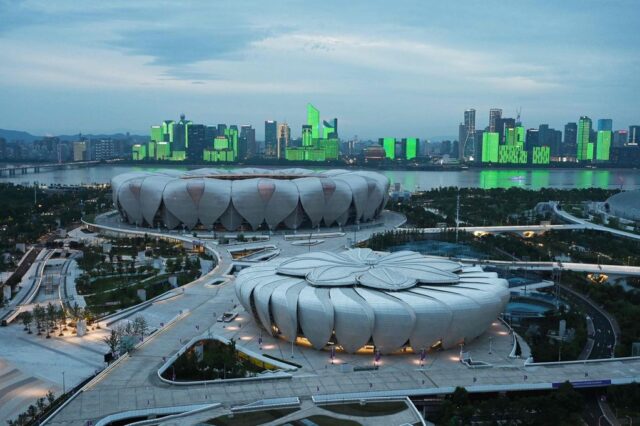The Hangzhou Asian Games, scheduled from September 23 to October 8, is preparing to become the fist sustainable and carbon-neutral Asian Games.
The Hangzhou Asian Games is focusing on eight special actions including green energy supply, green transport, resource recovery system and carbon offset to align with global pushes for sustainable sporting events.
As declared by Qiu Peihuang, the Director of the Venues Department of the Games Organizing Committee, the event is set to become the first ‘Smart, Green and Sustainable’ Asian Games.
“Among the 56 venues, only 12 are newly built, and the rest of the venues are rebuilt and temporarily built. All of our electricity is green electricity,” Qiu said.
Green Power at Hangzhou Asian Games
Green electricity refers to zero or extremely low carbon dioxide emissions during its production, making it more environmental- friendly than traditional thermal power generation methods.
The green electricity, for the Asian Games, is created by utilizing photovoltaic power from areas of the ancient Silk Road like Qinghai, Gansu, and the Loess Plateau, as well as wind power from Xinjiang and Zhejiang Province.
It is reported almost 621 million kWh of green electricity has already been transported via ultra-high voltage grids from those renewable energy sources. This has saved 76,320.9 tons of standard coal in the process. This energy source will illuminate all 65 venues and associated offices at the Asian Games.
Green Practices at Hangzhou Asian Games
In an effort to go green in the transportation sector, Hangzhou is creating multiple charging points for electric vehicles. Currently, the city boasts 102 charging stations and 2,024 charging piles.
The Hangzhou Asian Games is focused to promote the concept of a zero-waste city. The venues are designed using green building materials and organic circulation system to recycle resources like rainwater and heat energy. This will ensure their post-game utilization for a sustainable development of the region.
“On one hand, many venues will become fitness centers for citizens in some areas, and on the other hand, many venues will cooperate with commercial companies,” Qiu Peihuang added.
Carbon Offset at Hangzhou Asian Games
Carbon offsetting is a process that enables individuals or organizations to purchase carbon credits to compensate for the greenhouse gas emissions produced in daily life.
Till date, government and private organizations spanning across various industries have contributed to the initiative. The combined carbon offset donations for the Games have reached 1.068 million tons.
“From the start of preparations, a certain amount of carbon emissions was to be expected. To address this, we enlisted qualified accounting agencies to calculate the emissions throughout the entire preparation process, based on international standards, which helped us estimate the emissions reduction needed for carbon offsetting,” said an official from the Hangzhou Asian Games Organizing Committee.
There are also several private initiatives like “Plant a Tree for the Asian Games” and “Every Person, 1 Kilogram: Supporting Carbon Neutrality at the Asian Games” that have garnered the participation of over 100 million individuals.
Thus, Hangzhou Asian Games is working towards creating the first-ever carbon-neutral Games and aiming to set an example by celebrating sustainable development and green initiatives.




